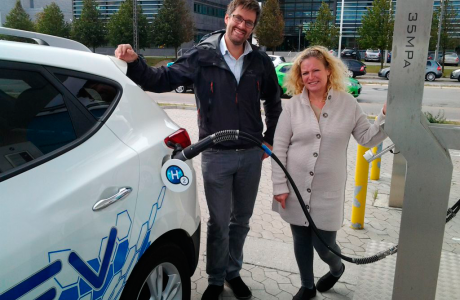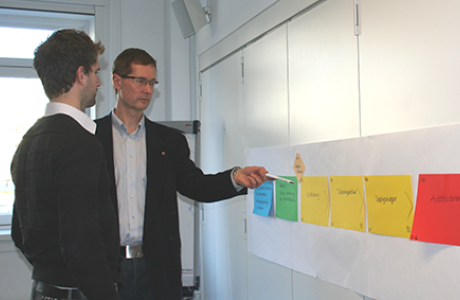Swedish procurement of FCEVs from Hyundai
Skåne Regional Council, the southernmost county of Sweden, has signed a public contract with Hyundai for two fuel cell electric vehicles. This is the first time a public procurement for FCEVs has been carried out in Sweden and the cars will also be the first of its kind in the country when they arrive in spring 2013.
[fusion_builder_container hundred_percent="yes" overflow="visible"][fusion_builder_row][fusion_builder_column type="1_1" background_position="left top" background_color="" border_size="" border_color="" border_style="solid" spacing="yes" background_image="" background_repeat="no-repeat" padding="" margin_top="0px" margin_bottom="0px" class="" id="" animation_type="" animation_speed="0.3" animation_direction="left" hide_on_mobile="no" center_content="no" min_height="none"]
The Regional Council of Skåne is engaged in a strategic effort to reduce greenhouse gas emissions. The aim is to be 100 % fossil free by 2020. With the purchase of hydrogen-powered cars, they help to support the market for vehicles with zero local emissions of CO2 and no other harmful particles from the exhaust pipe. Since the fuel cell vehicles have an electric motor, it also reduces the noise levels, a great advantage not least in the cities
“The Region Skåne is one step ahead of the national goals saying that Sweden should have a fossil free vehicle fleet in 2030. Using hydrogen cars will further increase the pace in the region and at the same time we are active in developing the market for the car fleet of the future" says Deputy Governor Monika Ekström, Chair of the Committee on Properties and Services, Member of the Regional Executive Committee.
The City of Copenhagen has also recently concluded a procurement of FCEVs from Hyundai. They are buying six cars within the Next Move project and an additional nine cars through the European HyTEC project.
To further strengthen the market for hydrogen and FCEVs in Scandinavia, Hyundai, Honda, Toyota and Nissan recently signed a MoU together with Scandinavian organizations, on cooperation for a market introduction of FCEVs in 2014-2017.
Contact Region Skåne
Deputy Governor, Chair of the Committee on Properties and Services, Member of the Regional Executive Committee.
+46-768-87 12 60
Environmental Strategist
+46-768-87 03 93
Contact Next Move:
Jessica Vacklid, project manager Next Move
Hydrogen Sweden
+46-705-08 89 06[/fusion_builder_column][/fusion_builder_row][/fusion_builder_container]
Region Skåne procuring hydrogen cars
[fusion_builder_container hundred_percent="yes" overflow="visible"][fusion_builder_row][fusion_builder_column type="1_1" background_position="left top" background_color="" border_size="" border_color="" border_style="solid" spacing="yes" background_image="" background_repeat="no-repeat" padding="" margin_top="0px" margin_bottom="0px" class="" id="" animation_type="" animation_speed="0.3" animation_direction="left" hide_on_mobile="no" center_content="no" min_height="none"]
Region Skåne is the first public body in Sweden in a procurement process for fuel cell cars. This is a result of the EU-funded project Next Move. Next Move facilitates cooperation across borders to meet strategic challenges like purchasing and service, for the regions and municipalities that want to become early users of FCEVs. The project partners collaborate in a joint procurement process, though each partner makes it’s own purchase. First in line was Copenhagen city, which since 2011 only purchase zero emission vehicles for the municipality. The communities and regions in Next Move are in 2012 to purchase hydrogen-powered FCEVs to a total value of approximately 3,18 million €. Region Skåne is open for tenders between 25 May and 4 July 2012.
“It is important that the question of hydrogen refuelling stations and hydrogen cars does not become a catch-22. Thus by procuring Skåne’s first hydrogen cars through the project Next Move, Region Skåne pushes the development of a hydrogen infrastructure, which in turn can generate more vehicles. In this way we, as a public organization, take the lead and in a responsible manner pave way for future opportunities,” says Oddvar Fiskesjö, Pro tempore head of department of Environmental strategies at Region Skåne.
Otto Andersson, strategic purchaser at Region Skåne, has prepared the procurement process. "Even if the technology is relatively new and competition in the market is limited, we hope to receive some various tenders within our price level. This procurement will hopefully be a starting point for Sweden to adopt fuel cell technology and to drive the development forward and inspire other organizations to do the same," he says.[/fusion_builder_column][/fusion_builder_row][/fusion_builder_container]
Danish Government to launch hydrogen Infrastructure Program & continue FCEV tax exemptions throughout 2015
The Danish Government has announced a new Energy Plan 2020 that includes establishment of a range of initiatives for hydrogen infrastructure and FCEV's with the overall aim to reach 100% fossil independence by 2050. The Government initiatives follow the recommendations from a recent Danish industry coalition analysis & roadmap on "Hydrogen for transport in Denmark onwards 2050".
The hydrogen initiatives in the Danish Energy Plan 2020 provide a strong basis for establishing the hydrogen infrastructure needed to enable market introduction of fuel cell electric vehicles (FCEV's) beyond 2015. A new Infrastructure Program is to be established providing support for roll-out of infrastructure for both FCEV's and BEV's during 2012-2015. The Program together with already initiated industrial initiatives can enable establishment of a country wide hydrogen refueling network by 2015. Already implemented tax exemptions on up to €0,08/kWh on electricity for hydrogen production provides a strong case for a renewable hydrogen supply for the infrastructure network. The existing Danish tax exemption for FCEV's is to be continued throughout 2015, ensuring a 180% tax reduction compared to conventional vehicles. With indicated FCEV's vehicle pricing by 2015, this could enable a FCEV market introduction price competitive to that of comparable gasoline vehicles. In Denmark 180% tax and 25% VAT is applied on the base vehicle price meaning that a €17.000 gasoline vehicle reaches an end-price for the vehicle-user on €50.000. This provides an indirect support on more than €23.000 for each FCEV after payment of 25% VAT.
The Danish Energy Plan also outlines a set of Government analyses to be conducted to pave the way for continued efforts beyond 2020, with the aim to reach 100% fossil independence by 2050. The joint focus of the various analyses is to ensure an optimal linkage between the power/heat and transport sectors and ensure optimal utilization of the limited biomass potential. Further the analyses are to suggest solutions for energy storage of the increasing amount of fluctuating renewable electricity, which is to reach 50% share of power and heat consumption by 2020 and 100% by 2035. Hydrogen plays a key role in both energy storage as well as connecting the power/heat and transport sector. Further hydrogen can act as a key component in the production of bio fuels and biogas from biomass, thus helping to boost the potential of the limited biomass. The various Danish Government analyses are therefore expected to provide strong basis for continued support mechanisms for hydrogen beyond 2015. The new Danish hydrogen support initiatives follow years of continued and increasing public support for fuel cells and hydrogen (FCH) research, development and demonstration in Denmark. Since 2001 public R&D programs have provided €150 million in public support for FCH activities, reaching €29 million in 2010 alone, corresponding to one third of all public funding for energy R&D in Denmark that year. The public funding for FCH activities in Denmark are expected to reach more than €30 million in 2011 when fully summarized later this year.
Pressrelease from Hydrogen Link Denmark 22 March 2012.
The Next Move purchase process has started
 A dozen project participants from Norway, Denmark and Sweden met in Copenhagen January 30 to start the joint process of the work package purchase. Six organizations in the project take on the exciting process of procurement of FCEVs (hydrogen-powered fuel cell vehicles). They will have different pace, but a common knowledge sharing throughout the way. The start-up meeting gathered purchasing, technical and legal expertise from the various organizations.
A dozen project participants from Norway, Denmark and Sweden met in Copenhagen January 30 to start the joint process of the work package purchase. Six organizations in the project take on the exciting process of procurement of FCEVs (hydrogen-powered fuel cell vehicles). They will have different pace, but a common knowledge sharing throughout the way. The start-up meeting gathered purchasing, technical and legal expertise from the various organizations.
The meeting agenda included identification of the different procurement process in each country and where the critical points are, as well as a discussion regarding when and how knowledge sharing is to occur along the way.
First out in the procurement process is the City of Copenhagen. Over a week ago they published an indicative notice ("Prior Information Notice") about the upcoming Next Move-procurement in the EU's public procurement system.
Coordinator of Work Package Purchase is Birte Busch Thomsen, City of Copenhagen.
City wide hydrogen transport networks launched in London and Copenhagen
On the 31st October 2011 a new hydrogen transport project was launched that will see citywide hydrogen networks developed in London and Copenhagen. HyTEC (Hydrogen Transport in European Cities) which is part funded by the Fuel Cells & Hydrogen Joint Undertaking (FCH JU), pulls together 16 organisations in a three year project to put the two cities at the forefront of efforts to establish ultra-low carbon hydrogen transport infrastructure in Europe.
The project will see 30 hydrogen powered vehicles, including cars, taxis and scooters divided between the two cities and connected by new hydrogen fuelling stations.
An aim of HyTEC is to identify and address potential barriers to the wider roll-out of ultra-low carbon hydrogen vehicles around Europe. A research team will review data from the vehicles allowing a full-analysis of their performance during a sustained period of urban driving.
In an effort to understand the best methods for rolling out hydrogen transport, each city will adopt a different approach to hydrogen vehicle demonstration, trialling different vehicle types and approaches to fuelling infrastructure rollout.
In London, a new hydrogen fuelling station will connect up the City’s three fuelling stations that will be in operation. This will focus on the development of hydrogen transport infrastructure in urban centres.
While in Copenhagen, a publicly accessible fuelling network will be developed and linked to other majors cities around Denmark as part of an effort to secure a countrywide network for hydrogen transport from 2015.
Read the pressrelease from 31 October 2011



